As I laid on the emergency room’s hospital bed, a volunteer said, “I’ve had seven children and kidney stones. I’d take labor pains over kidney stone pain anytime.”
Although I’m not sure I completely agree, I do know that pain from kidney stone, called renal colic, can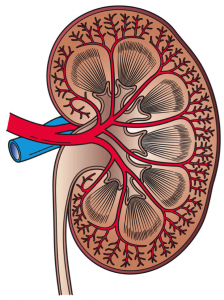 be excruciating. Over half a million people in the US arrive at the emergency department each year with renal colic from kidney stones and about 9% of the population will experience a kidney stone in their lifetime.
be excruciating. Over half a million people in the US arrive at the emergency department each year with renal colic from kidney stones and about 9% of the population will experience a kidney stone in their lifetime.
In 6 Facts You Probably Didn’t Know About Your Kidneys, I described how the kidneys function in our body as filters. Around 200 quarts of blood are filtered by the kidneys every day, removing wastes and extra fluids. Calcium, oxalates and phosphorous are part of the waste that is removed. When these compounds become concentrated in the urine, kidney stones can form.
Types of kidney stones
Calcium oxalate are the most common types of stones formed in the kidneys.
Struvite stones are caused by infections in the kidneys. These are made up of magnesium and ammonia.
Uric acid stones are related to weight and diet, but may also run in families. Purines, found in high concentrations in shellfish, like shrimp or in “organ meats” like liver or brain, are the culprits. As purines are metabolized, they form high amounts of urates. Concentrated uric acid in the kidneys can form uric acid stones and is also associated with gout.
Cystine stones are composed of the protein cystine and are associated with the rare disorder cystinuria.
Factors influencing kidney stone formation
Genetic Factors
I have a family history of kidney stones, both my father and grandfather had kidney stones, perhaps leading them both to become urologists.
![]() There are some specific genetic conditions that have been identified that cause kidney stones. Some families have a condition called hypercalciuria: a disorder in which their urine contains high levels of calcium.
There are some specific genetic conditions that have been identified that cause kidney stones. Some families have a condition called hypercalciuria: a disorder in which their urine contains high levels of calcium.
![]() In 5 Things You Probably Didn’t Know About Your Parathyroid Glands, I described the function of the parathyroid glands. Hyperparathyroidism is a condition in which your parathyroid glands release too much hormone, causing excessive calcium in the blood, and therefore also in the urine.
In 5 Things You Probably Didn’t Know About Your Parathyroid Glands, I described the function of the parathyroid glands. Hyperparathyroidism is a condition in which your parathyroid glands release too much hormone, causing excessive calcium in the blood, and therefore also in the urine.
![]() Cystinuria is a rare disease that is inherited. People with this condition develop stones made up of the amino acid cystine which builds up in the kidneys.
Cystinuria is a rare disease that is inherited. People with this condition develop stones made up of the amino acid cystine which builds up in the kidneys.
![]() Renal Tubular Acidosis can be either inherited or it can be the result of conditions that affect many organ systems of the body, like lupus. This disorder results in blood that is too acidic. Some people think that Dickens’ Tiny Tim character had this disorder.
Renal Tubular Acidosis can be either inherited or it can be the result of conditions that affect many organ systems of the body, like lupus. This disorder results in blood that is too acidic. Some people think that Dickens’ Tiny Tim character had this disorder.
![]() Hyperoxaluria affects around 58,000 people worldwide and is caused by genetic mutations. As the name suggests, oxalate content in the urine is high.
Hyperoxaluria affects around 58,000 people worldwide and is caused by genetic mutations. As the name suggests, oxalate content in the urine is high.
![]() Hyperuricosuria means that your urine contains high levels of uric acid. Physicians recommend reducing red meat, beer, liquor, and high fructose corn syrup, all of which are associated with higher uric acid production. Following the Mediterranean diet helps.
Hyperuricosuria means that your urine contains high levels of uric acid. Physicians recommend reducing red meat, beer, liquor, and high fructose corn syrup, all of which are associated with higher uric acid production. Following the Mediterranean diet helps.
![]() Polycystic kidney disease (PKD) is a genetic disorder affecting around 600,000 people in the US. Liquid-filled cysts develop in the kidneys, replacing normal kidney tissue and affecting their functions. People with this condition begin to have symptoms in their 30s and 40s of frequent kidney and bladder infections, kidney stones, high blood pressure, back pain and an increase in the size of the abdomen. There is no cure for PKD and about half of people with PKD develop kidney failure by the age of 60.
Polycystic kidney disease (PKD) is a genetic disorder affecting around 600,000 people in the US. Liquid-filled cysts develop in the kidneys, replacing normal kidney tissue and affecting their functions. People with this condition begin to have symptoms in their 30s and 40s of frequent kidney and bladder infections, kidney stones, high blood pressure, back pain and an increase in the size of the abdomen. There is no cure for PKD and about half of people with PKD develop kidney failure by the age of 60.
Medications
Some medications can increase the risk of kidney stones. Examples include diuretics, calcium based antacids and topiramate, an anti-seizure medication that is also used to prevent migraines.
Preventing kidney stones
BMI
A body mass index greater that 30 kg/m2 is associated with increased risk of being diagnosed with a kidney stone. Losing weight can help prevent kidney stones.
Food and fluid intake
Intake of sodium: Sodium in salt can increase the amount of calcium that is excreted by the kidneys. People in the US take in about 3,400 mg of sodium per day. The new American Urological Association guidelines on the medical management of kidney stones recommends that people who are susceptible to kidney stones reduce their sodium intake to 1500 mg per day.
Certain foods: The new American Urological Association guidelines on the medical management of kidney stones recommends eating foods rich in citrate, like lemons and limes – this means getting four 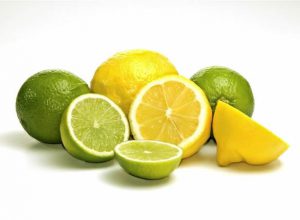 ounces of lemon or lime concentrate everyday.
ounces of lemon or lime concentrate everyday.
The new guidelines say to eat three to four servings of calcium everyday as well.
There is some debate as to changes in diet. Based on the type of kidney stone, you produce, your urologist will recommend a diet that matches the type of stone you create.
Fluid Intake: Although six to eight 8-ounce glasses are recommended for the normal individual, the new American Urological Association guidelines on the medical management of kidney stones recommends drinking ten 10-ounce glasses per day of any liquid except for dark colas for people who are risk or have had kidney stones.
Exercise: People who have had or are at risk of kidney stone formation should exercise regularly.
Signing up for Medivizor
It has been a long time since my kidney stone but after my experience with renal colic, I’m not taking any chances. I signed up for Medivizor to get updates on what is new around. It was easy. I didn’t have many details to complete the forms but that was okay. I still received great information.
First I got a personalized refresher about kidney stones which I found incredibly helpful. Then there were 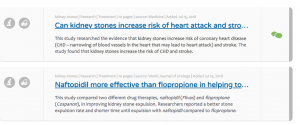 studies in my Personal Space that I could read.
studies in my Personal Space that I could read.
One was called “Can kidney stones increase risk of heart attack and stroke?” It was a description of a meta-analysis of eight studies which involved over 3 million participants. The analysis found that having had kidney stones increased the risk of coronary heart disease by 24% and stroke by 21%.
It looks like taking care of my kidneys and doing my best to prevent more kidney stones can help me reduce my risk of heart disease and stroke. Sounds like a win to me.

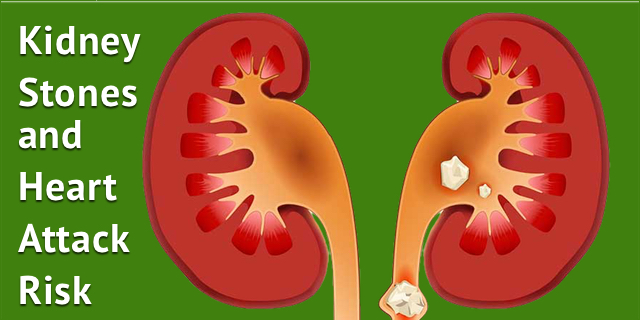


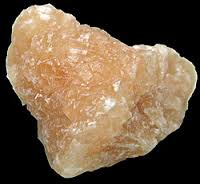


Very helpful information thanks
Thank you for this website. My 14 year old daughter began having severe symptoms that looked like seizures but the hospital said they were panic attacks and then at age 30 she had a bad attack and the squad came and told us that my daughter was not having a panic attack she was ready to code. After that one she was fine. At 33 her age now, she was having a very high heart rate and chest pain and high blood pressure . the er dr couldn’t figure out what or why she was having chest pain and high blood pressure and very fast heart rate. Well they sent her home again and a few nights later she woke up in the Middle of the night with severe pain in her side and they did a cat scan and found a kidney stone that was 2cm and she had to have it removed. So she had it removed and all the sudden her chest pain stopped her blood pressure is normal . i began to link the kidney stones with the heart issues and it all became clear. All the years of kidney stones and infections very well have caused hher heart problems.i am so upset that they couldn’t fi g ure. Out why shes having the chest pain and other symptoms. . i pray that she dont have heart disease from this.
Hello, this all problems are happening with me , i have 23 mm kidny stone, sometimes my heart rate goes fast but no-one accepting as kidny stone and heart has some connection, that’s why i get panic attack about it , i qas so frustrated , but now i am strong, and pretty sure kidny stone increase stress and also have possibilities of anxiety or panic attack…
I’m 32 and have had three confirmed stones at this point. The first was diabolical flank pain so bad I thought my kidney was dying and I weeper before the ER and while there. The second was detected as I simultaneously had diverticulitis but was not super painful. Now the third has caused bloating and chest pain possibly. For weeks off and on I could not sleep and months. Yet I somehow got some relief when I found one, which was tiny. I’ve had abdominal bloating and pain for months. The simple stone is a mystery. As others state I also panic and think I’m having a heart attack until feelings subside. I don’t understand how the symptoms change so drastically now. Sharp pains all over randomly and then gone as well. Then poof symptoms abate and I see the tiny stone. If anyone reads this who has had stones and gets chest bloat and feelings so uncomfortable they can’t lay on their side and need to walk or have panic attacks in addition, consider the stones….I have WILD symptoms. Pursuing a urologist soon to test the stones and get real professional help. Good luck everyone.
Kindly someone help me am having 2.5mm kidney stone since August last year’s the pain is too much on me I can’t assists myself have been in hospital they ask me to endure the pain but the pain is getting too much on me help me pls
Please seek a urologist to have the stone removed as soon as possible .
Hello everyone. I just recently had a 8mm kidney stone remove by laser, I didn’t know I had one growing in me until I noticed blood in my urine I took myself to the ER and it was diagnosed. Scary and painful. I have spent almost the whole month of Feburary dealing with the ordeal of having to go thru a surgery 2 times.
The first attempt I was told that the ureter was too small / narrow and they put in a stent to stretch it out for a week then back again a week later this time it was removed, the stent was left in for another week,this was very uncomfortable finally got that out and then developed a UTI ( urinary tract infection) the weird thing about all of this is that I have noticed my heart has hardly any arrhythmia at all now. I was having them for a few months and now they seem to be gone. Going to have to tqalk with cardiologist about this . Wondering if the stone could have been part of the reason I was having the irregular heart beats.
I just had a kidney stone removed this morning around 9am.I am 30 years old,and surgeries normally goes well.They did a laser.But when I woke up I immediately had a panic attack and having trouble breathing.It was a horrible experience.I have bad anxiety,and acid reflex.I got red dots all over my eyes and around my eyes.I’m thinking a allergic reaction.If anyone knows what this is from please share.
I never felt this bad in my life.I got home and passed out i was holding onto the door knob truck and collasped.I been having chest pains high heart rate and its not going away and tightens.Ive always had chest pains but not like this.I really think kidney stones is leaked to heart trouble.I got more kidney stones but their little hoping they will pass
Kidney stones are an absolute reason for a lot of heart disease, anxiety,panic attacks,even heart attacks and strokes.Trust me I am a mother who’s handicap daughter is suffering from 2 (7cm) kidney stones.She has never had high blood pressure and all the other issues she is having right now,but all her symtoms including chest pain and high blood pressure,and increased heart rate.Right now heart rate is 112.When I called EMS her heart rate was 120.Well that’s hypertension.They sent her home from the hospital and was still very sick.They did stints on both sides of kidneys.My biggest question is why why why would they send her home without removing them.Urologist very bluntly said she will not pass them they are lodged and too big??I’m confused???
Hi i just had PCI 2 weeks prior now i am experiencing pain from kidney stones. The doctors said that the risk of my heart failing during the removal procedure is high, if i postpone the procedure, my kidney might end up worst. What should i do